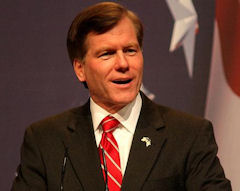 Gov. Bob McDonnell has submitted a proposed budget for the next biennium that is built upon anticipated revenue growth of 3.3% in 2013 and 4.5% in 2014. Crafted with an eye to maintaining Virginia’s AAA bond rating, which Moody’s Investors Services had placed on credit watch this summer, the governor couples modest spending increases in core areas with several moves designed to shore up the state’s financial strength.
Gov. Bob McDonnell has submitted a proposed budget for the next biennium that is built upon anticipated revenue growth of 3.3% in 2013 and 4.5% in 2014. Crafted with an eye to maintaining Virginia’s AAA bond rating, which Moody’s Investors Services had placed on credit watch this summer, the governor couples modest spending increases in core areas with several moves designed to shore up the state’s financial strength.
Among the highlights, McDonnell proposes:
- Allocating $2.21 billion in total employer contributions to shore up Virginia’s under-funded retirement system, helping make up for previous under-funding.
- Boosting the state’s Rainy Day Fund by $132 million in FY 2013 and $168 million in FY 2014, bringing the total to more than $600 million.
- Appropriating $50 million to eliminate the accelerated sales tax affecting roughly 7,000 retailers.
- Leaving $31 million unappropriated, “reflecting the need for a greater cushion given economic uncertainty.”
The new budget finds more money for Medicaid, K-12 education, higher education, mental health and economic development, and it does so without raising taxes. For the most part, it’s a sober-minded budget for a sobering time.
“I believe government must get more focused and effective,” McDonnell said in a prepared statement he was scheduled to deliver to a joint meeting of the Senate Finance, House Appropriations and House Finance Committees. “That work must occur as we navigate through a financial world marked by crisis and insolvency in Europe, the rise of China and India, crushing debt, shutdown threats and unfunded mandates from Washington and our citizens’ rightful demand that government work better.”
Looking at the big picture, McDonnell takes only one major wrong turn, but it’s a biggie — diverting tens of millions of dollars from the General Fund budget to transportation, which traditionally has relied upon dedicated revenue streams. Refusing to raise the motor fuels tax, McDonnell is abandoning any pretense of a “user pays” principle for transportation funding. That is wrong, wrong, wrong, as I will explain in a future post.
— JAB


